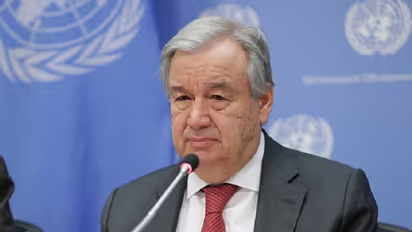Leaders must act to 'save humanity': UN chief Antonio Guterres at COP26 climate summit

Synopsis
More than 120 state and government leaders are meeting in Glasgow for a two-day summit at the opening of the United Nations' COP26 conference, which organisers believe is critical for mapping humanity's route away from catastrophic global warming.
UN Secretary-General Antonio Guterres warned on Monday that global leaders must act to "rescue humanity" as world leaders gathered for the historic COP26 climate summit, which observers said opened with more talk than action. More than 120 state and government leaders are meeting in Glasgow for a two-day summit at the opening of the United Nations' COP26 conference, which organisers believe is critical for mapping humanity's route away from catastrophic global warming. However, Prime Minister Narendra Modi's much-anticipated talk on Monday dampened the enthusiasm somewhat: the world's third-largest emitter would only attain net-zero emissions by 2070.
COP26 is being described as critical to the long-term survival of the Paris Agreement, which nations joined in 2015 by agreeing to restrict global temperature rises to "well below" two degrees Celsius and aim toward a safer 1.5 degree Celsius threshold. With a little more than 1 degree Celsius of warming since the Industrial Revolution, the Earth is being hammered by increasingly severe heatwaves, flooding, and tropical storms, all exacerbated by rising seas.
Also Read | Prime Minister Modi shares 'adaptation' mantra at mega climate meet
Governments are under pressure to increase their emissions-cutting pledges to meet the Paris targets and provide long-promised funds to assist developing nations in greening their grids and preparing for future disasters. The G20, which includes China, India, and Western nations, agreed to stick to the Paris Agreement goal of limiting global warming to 1.5 degrees Celsius. They also resolved not to support new coal plants in other countries that do not deploy carbon-capture-and-storage technology by the end of 2021.
However, the specific road to 1.5 degrees Celsius was mainly left unclear, and activists expressed dissatisfaction with the group, which jointly generates about 80% of global carbon emissions. A series of high-profile no-shows had hampered preparations for the high-level meeting. Neither Chinese President Xi Jinping, who has not left the nation throughout the Covid-19 outbreak nor Russian President Vladimir Putin will be present in Glasgow.
Also Read | Climate change big challenge for agriculture sector: PM Modi at COP26 global climate summit
Australian Prime Minister Scott Morrison, who attracted criticism from environmentalists last week for his country's "net-zero" strategy, has doubled down on a decarbonisation vision primarily reliant on future innovation. Most countries have already filed their revised emissions-cutting plans, called as "nationally determined contributions," or NDCs, ahead of COP26. By far the world's largest carbon polluter, China has officially presented its new climate plan to the United Nations, which reiterates a long-standing objective of peaking emissions by 2030.
Meanwhile, India has yet to submit a new NDC, as required by the Paris Agreement. PM Modi stated that his country will attain net-zero emissions by 2070 and that renewable energy would account for 50% of total energy consumption by 2030. Another significant issue is wealthy countries' inability to provide $100 billion each year to assist climate-vulnerable nations in adapting to climate change. The objective, which was supposed to be fulfilled last year, has been pushed back to 2023, aggravating tensions between wealthy nations, which are to blame for global warming, and poorer ones, who are the victims of its impacts.
Also Read | British Prime Minister Boris Johnson kickstarts COP26 climate summit, warns of ‘doomsday’
Check the Breaking News Today and Latest News from across India and around the world. Stay updated with the latest World News and global developments from politics to economy and current affairs. Get in-depth coverage of China News, Europe News, Pakistan News, and South Asia News, along with top headlines from the UK and US. Follow expert analysis, international trends, and breaking updates from around the globe. Download the Asianet News Official App from the Android Play Store and iPhone App Store for accurate and timely news updates anytime, anywhere.